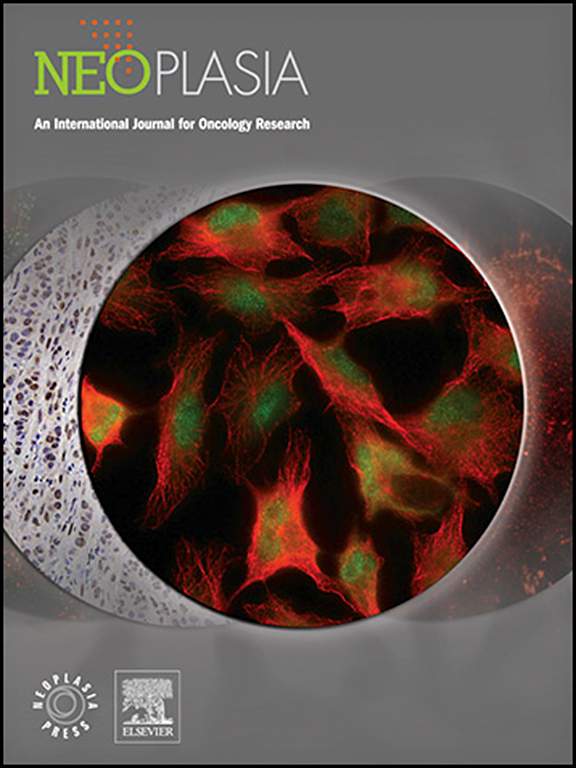MTFR1 phosphorylation-activated adaptive mitochondrial fusion is essential for colon cancer cell survival during glucose deprivation
IF 7.7
2区 医学
Q1 Biochemistry, Genetics and Molecular Biology
引用次数: 0
Abstract
Background
Mitochondrial dynamics are essential for maintaining cellular function under metabolic stress. However, their role in colon cancer's response to glucose deprivation remains poorly understood.
Methods
The role of the mitochondrial protein MTFR1 in colon cancer proliferation was evaluated using CCK-8 and colony formation assays. Mass spectrometry identified MTFR1-interacting proteins and phosphorylation sites. Mitochondrial morphology was examined with Mitotracker staining, and mitochondrial function was evaluated using MitoSOX, JC-1 staining, and the Seahorse cell mitochondrial stress test.
Results
We observed that MTFR1 is highly expressed in colon cancer cells and interacts with NEK1 under glucose deprivation. This interaction induces phosphorylation of MTFR1 at serine 119, which promotes mitochondrial fusion and supports mitochondrial function. Consequently, enhanced oxidative phosphorylation improves cellular tolerance to glucose deprivation.
Conclusions
Our findings highlight the importance of MTFR1 in modulating mitochondrial dynamics and its potential impact on colon cancer cell survival under metabolic stress. These results suggest that MTFR1 serine 119 could be a key regulator of colon cancer cell metabolism and a potential therapeutic target for enhancing cancer cell response to metabolic challenges.
MTFR1磷酸化激活的适应性线粒体融合对于葡萄糖剥夺期间结肠癌细胞的存活至关重要
线粒体动力学对于维持代谢应激下的细胞功能至关重要。然而,它们在结肠癌对葡萄糖剥夺的反应中所起的作用仍然知之甚少。方法采用CCK-8法和集落形成法评价线粒体蛋白MTFR1在结肠癌细胞增殖中的作用。质谱鉴定了mtfr1相互作用蛋白和磷酸化位点。采用Mitotracker染色检测线粒体形态,采用MitoSOX、JC-1染色和海马细胞线粒体应激测试评估线粒体功能。结果我们观察到MTFR1在结肠癌细胞中高表达,并在葡萄糖剥夺下与NEK1相互作用。这种相互作用诱导MTFR1丝氨酸119位点的磷酸化,从而促进线粒体融合并支持线粒体功能。因此,氧化磷酸化的增强提高了细胞对葡萄糖剥夺的耐受性。结论我们的研究结果强调了MTFR1在调节线粒体动力学中的重要性及其对代谢应激下结肠癌细胞存活的潜在影响。这些结果表明,MTFR1丝氨酸119可能是结肠癌细胞代谢的关键调节因子,也是增强癌细胞对代谢挑战反应的潜在治疗靶点。
本文章由计算机程序翻译,如有差异,请以英文原文为准。
求助全文
约1分钟内获得全文
求助全文
来源期刊

Neoplasia
医学-肿瘤学
CiteScore
9.20
自引率
2.10%
发文量
82
审稿时长
26 days
期刊介绍:
Neoplasia publishes the results of novel investigations in all areas of oncology research. The title Neoplasia was chosen to convey the journal’s breadth, which encompasses the traditional disciplines of cancer research as well as emerging fields and interdisciplinary investigations. Neoplasia is interested in studies describing new molecular and genetic findings relating to the neoplastic phenotype and in laboratory and clinical studies demonstrating creative applications of advances in the basic sciences to risk assessment, prognostic indications, detection, diagnosis, and treatment. In addition to regular Research Reports, Neoplasia also publishes Reviews and Meeting Reports. Neoplasia is committed to ensuring a thorough, fair, and rapid review and publication schedule to further its mission of serving both the scientific and clinical communities by disseminating important data and ideas in cancer research.
 求助内容:
求助内容: 应助结果提醒方式:
应助结果提醒方式:


